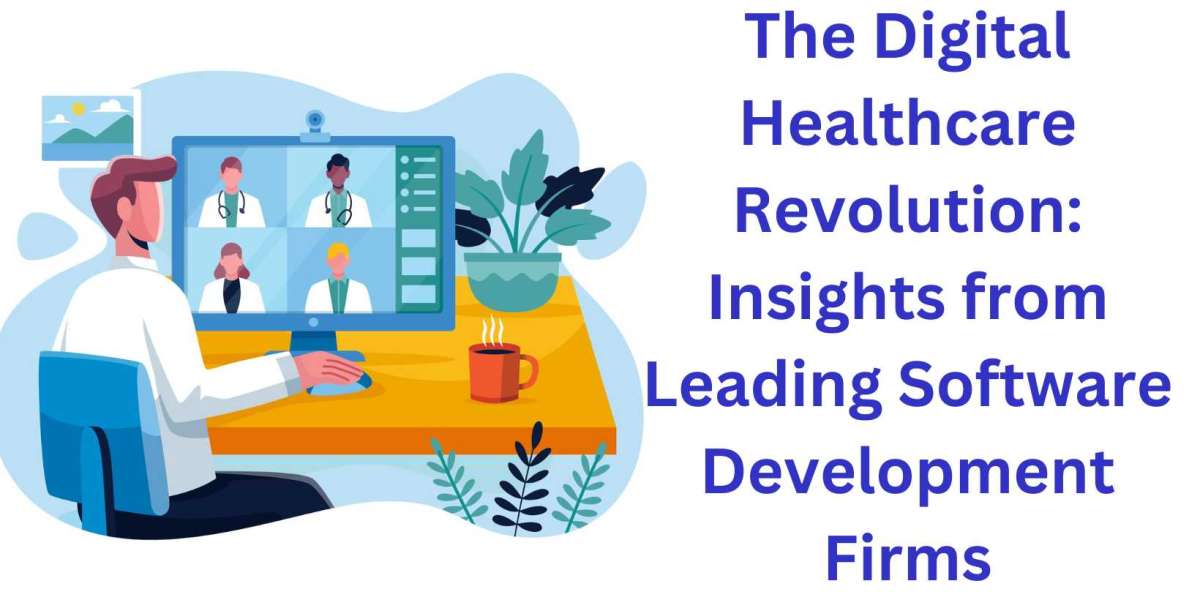Introduction
The healthcare industry is undergoing a significant transformation, driven by advancements in technology and the growing demand for efficient and personalized care. At the forefront of this revolution are leading software development firms, which are creating innovative solutions to improve patient outcomes, streamline operations, and enhance the overall healthcare experience. In this article, we will explore the key trends and technologies shaping the digital healthcare revolution and provide insights from top software development firms.
The Rise of Telemedicine
What is Telemedicine?
Telemedicine refers to the use of telecommunication technology to provide healthcare services remotely. This includes video consultations, remote monitoring, and electronic health records. Telemedicine has gained immense popularity, especially during the COVID-19 pandemic, as it allows patients to receive care without visiting a healthcare facility physically.
Benefits of Telemedicine
- Increased Accessibility: Telemedicine makes healthcare services accessible to patients in remote or underserved areas.
- Convenience: Patients can consult with healthcare providers from the comfort of their homes.
- Cost-Effective: Reduces travel expenses and minimizes time off work for medical appointments.
Technologies Enabling Telemedicine
- Video Conferencing Tools: Platforms like Zoom and Microsoft Teams facilitate virtual consultations.
- Remote Monitoring Devices: Wearable devices that track vital signs and send data to healthcare providers.
- Electronic Health Records (EHRs): Digital records that provide a comprehensive view of a patient's medical history.
Artificial Intelligence in Healthcare
Role of AI in Healthcare
Artificial Intelligence (AI) is transforming healthcare by enabling faster and more accurate diagnoses, personalized treatment plans, and improved patient outcomes. AI algorithms can analyze vast amounts of data and identify patterns that humans might miss.
Applications of AI in Healthcare
- Medical Imaging: AI-powered tools can analyze medical images to detect abnormalities such as tumors or fractures.
- Predictive Analytics: AI can predict disease outbreaks, patient readmissions, and treatment responses.
- Natural Language Processing (NLP): Helps in analyzing patient records and extracting meaningful information for better decision-making.
Challenges of AI in Healthcare
- Data Privacy: Ensuring the privacy and security of patient data is a significant concern.
- Bias in Algorithms: AI algorithms can be biased if trained on non-representative data.
- Regulatory Compliance: Navigating the complex regulatory landscape is challenging for AI applications.
Internet of Things (IoT) in Healthcare
What is IoT?
The Internet of Things (IoT) refers to interconnected devices that communicate and share data with each other. In healthcare, IoT devices can monitor patients' health in real-time and provide valuable insights to healthcare providers.
Applications of IoT in Healthcare
- Remote Patient Monitoring: IoT devices like wearable sensors can track patients' vital signs and send data to healthcare providers.
- Smart Medical Devices: Devices like smart inhalers and insulin pumps help manage chronic conditions more effectively.
- Asset Tracking: IoT technology can track medical equipment and supplies within healthcare facilities.
Benefits of IoT in Healthcare
- Improved Patient Outcomes: Real-time monitoring allows for timely interventions and better management of chronic diseases.
- Operational Efficiency: IoT devices streamline operations and reduce administrative burdens.
- Cost Savings: Reduces hospital readmissions and unnecessary visits.
Blockchain Technology in Healthcare
What is Blockchain?
Blockchain is a decentralized digital ledger that records transactions in a secure and transparent manner. In healthcare, blockchain can ensure the integrity and security of patient data.
Applications of Blockchain in Healthcare
- Data Security: Blockchain provides a secure way to store and share patient data.
- Supply Chain Management: Ensures the authenticity and traceability of medical supplies and pharmaceuticals.
- Clinical Trials: Enhances the transparency and integrity of clinical trial data.
Benefits of Blockchain in Healthcare
- Enhanced Security: Protects patient data from cyberattacks and unauthorized access.
- Improved Data Sharing: Facilitates secure and seamless data sharing among healthcare providers.
- Increased Transparency: Provides a transparent and tamper-proof record of transactions.
Big Data and Analytics in Healthcare
Role of Big Data in Healthcare
Big Data refers to large volumes of data that can be analyzed to uncover patterns and insights. In healthcare, Big Data analytics can improve patient care, reduce costs, and enhance operational efficiency.
Applications of Big Data in Healthcare
- Patient Care: Analyzing patient data to identify risk factors and predict disease outbreaks.
- Operational Efficiency: Optimizing resource allocation and reducing waste.
- Personalized Medicine: Tailoring treatment plans based on individual patient data.
Challenges of Big Data in Healthcare
- Data Privacy: Ensuring the privacy and security of patient data is a major concern.
- Data Integration: Integrating data from various sources can be challenging.
- Data Quality: Ensuring the accuracy and reliability of data is critical.
Cloud Computing in Healthcare
What is Cloud Computing?
Cloud computing involves storing and accessing data and applications over the internet instead of on local servers. In healthcare, cloud computing offers scalable and cost-effective solutions for data storage and management.
Benefits of Cloud Computing in Healthcare
- Scalability: Easily scale up or down based on demand.
- Cost-Effective: Reduces the need for expensive hardware and maintenance.
- Accessibility: Enables healthcare providers to access data from anywhere, at any time.
Applications of Cloud Computing in Healthcare
- Data Storage: Securely store patient records and medical images.
- Collaboration: Facilitates collaboration among healthcare providers through shared access to data.
- Telehealth: Supports telehealth platforms by providing reliable and scalable infrastructure.
Cybersecurity in Healthcare
Importance of Cybersecurity
With the increasing digitization of healthcare, protecting sensitive patient data from cyber threats has become paramount. Cybersecurity measures ensure the confidentiality, integrity, and availability of healthcare data.
Common Cyber Threats in Healthcare
- Ransomware: Malicious software that encrypts data and demands ransom for its release.
- Phishing Attacks: Fraudulent attempts to obtain sensitive information by disguising as a trustworthy entity.
- Data Breaches: Unauthorized access to patient data can lead to identity theft and financial loss.
Strategies for Enhancing Cybersecurity
- Employee Training: Educate staff on recognizing and preventing cyber threats.
- Data Encryption: Encrypt data to protect it from unauthorized access.
- Regular Audits: Conduct regular security audits to identify and address vulnerabilities.
Augmented Reality (AR) and Virtual Reality (VR) in Healthcare
What are AR and VR?
Augmented Reality (AR) overlays digital information onto the real world, while Virtual Reality (VR) creates a completely immersive digital environment. Both technologies have significant applications in healthcare.
Applications of AR and VR in Healthcare
- Medical Training: AR and VR can simulate medical procedures for training purposes.
- Surgical Assistance: Surgeons can use AR to overlay critical information during surgery.
- Patient Education: VR can help patients understand their medical conditions and treatment options.
Benefits of AR and VR in Healthcare
- Enhanced Training: Provides realistic simulations for medical training without risk to patients.
- Improved Precision: Assists surgeons with precise information during procedures.
- Better Patient Engagement: Helps patients visualize their conditions and treatments.
Personalized Medicine
What is Personalized Medicine?
Personalized medicine tailors medical treatment to the individual characteristics of each patient. This approach considers factors like genetics, lifestyle, and environment to provide customized healthcare.
Benefits of Personalized Medicine
- Targeted Treatment: Provides treatments that are more effective for individual patients.
- Reduced Side Effects: Minimizes adverse reactions by tailoring medications to the patient's genetic profile.
- Improved Outcomes: Enhances patient outcomes through customized care plans.
Technologies Enabling Personalized Medicine
- Genomics: Analyzing a patient's genetic information to guide treatment decisions.
- Data Analytics: Using Big Data to identify patterns and predict treatment responses.
- Wearable Devices: Collecting real-time data on patient health and lifestyle.
The Future of Digital Healthcare
Emerging Technologies
As technology continues to evolve, several emerging technologies are poised to shape the future of healthcare. These include:
- 5G Connectivity: Enabling faster and more reliable data transmission for telemedicine and remote monitoring.
- Quantum Computing: Potential to revolutionize data analysis and predictive modeling in healthcare.
- Robotics: Advancements in robotic surgery and automation of routine tasks.
Impact on Healthcare Delivery
The integration of these technologies will lead to more efficient and effective healthcare delivery. Patients will benefit from personalized care, improved access to services, and better health outcomes.
Challenges and Considerations
While the future of digital healthcare is promising, several challenges must be addressed:
- Regulatory Compliance: Navigating the complex regulatory landscape for new technologies.
- Data Privacy and Security: Ensuring the protection of sensitive patient data.
- Interoperability: Ensuring seamless integration and communication between different systems and devices.
Conclusion
The digital healthcare revolution is transforming the way healthcare is delivered, making it more efficient, personalized, and accessible. By leveraging technologies such as telemedicine, AI, IoT, blockchain, Big Data, cloud computing, cybersecurity, AR, VR, and personalized medicine, healthcare providers can improve patient outcomes and streamline operations. As we look to the future, it is essential to stay abreast of emerging technologies and address the challenges that come with them. For healthcare organizations seeking to navigate this evolving landscape, partnering with a healthcare software development company can provide the expertise and support needed to stay ahead.








